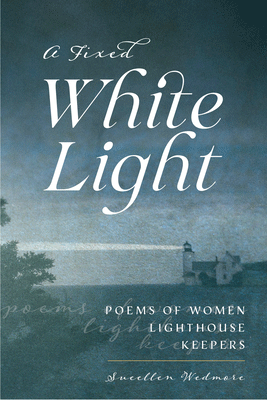A Fixed White Light: Poems of Women Lighthouse Keepers
By Suellen Wedmore (Down East Books, 2022)
Lighthouses are often repurposed, becoming private residences, museums, or centerpieces of a park. There may be a historical charm to them, but their role in protecting and saving lives is often forgotten.
They’re a kind of benign relic now, maybe even disconnected from their raison d’etre, that sailors’ survival at sea could be completely dependent on their light, supplied by the hard work of that beacon’s keeper. And the keepers—those jobs are mostly relegated to history, too.
Tending a lighthouse was usually a hardship posting, with deprivation of various sorts, social isolation, and serious occupational hazards. But might that life provide rewards as well as risks?
“Were these women exceptional… or were they average women thrust into situations which nurtured heroism?”
Poet Suellen Wedmore, author of A Fixed White Light and poet laureate emeritus for the town of Rockport, Mass., has researched the lives of six East Coast female lightkeepers from the 19th century. She has taken their experiences and given them words in poems, as if written by them. The poems carry individualized voices, and yet themes are shared, shaped by common circumstances—where they lived and what they did.
Wedmore tells us in her introduction, “In the last half of the 19th century, more than one hundred women worked as primary keepers of our country’s lighthouses. Twice as many were assistant keepers and many more worked without pay or recognition in their husband’s or in their father’s names…”
She reminds us that a “woman’s place” was seen as keeper of the hearth rather than keeper of a lighthouse, with its physical and emotional challenges of isolation and strenuous physical work. And she asks, “Were these women exceptional in their strength and endurance, or were they average women thrust into situations which nurtured heroism?”
The women she pays tribute to worked in places from Matinicus to Key West.

Wedmore brings these women alive with vivid descriptions of their experiences and their emotional underpinning. Barbara Mabrity, who in 1832 succeeded her husband as keeper after his death from yellow fever, remembers him—as Wedmore pictures it in this excerpt from the poem, “My Husband, Now I Climb”: “some clear day, will you approach and call my name? Nights, you know me: a fixed white light, keeper of the harbor.”
Catherine Moore, who took over in her adolescence after her father was injured as the keeper in Black Rock Harbor, Conn., describes her duties in “April 1820”:
“I stumble toward the tower’s spiral stairs, to kindle the wicks, a signal to those uneasy in this uncaring sea.”
Abbie Burgess was 14 when she began to help her father at the Matinicus Rock Light Station off the coast of Rockland in 1853. Wedmore writes of her reality, in “Needle and Black Thread”: “…isn’t a lighthouse’s promise of smooth sailing presumptuous, when the sea prefers havoc over calm?”
Of Kate Walker, stationed with her husband off Staten Island, Wedmore imagines her disappointment with life on a sliver of rocky ledge: “The room reeks of coal and kerosene. I won’t unpack, I think—what I want is geraniums, hollyhocks, croquet on a plush lawn.”
Ida Lewis lived at Lime Rock Light off Newport, R.I., helping her mother tend the light after her father had a stroke. Then, with her mother ill after her father’s death, she maintained it alone.
Wedmore sees her keenly aware of gender discrimination. In “After Twenty Years Working Without a Contract, Ida Considers Addressing the Superintendent of Lighthouses,” she writes, “…A man would have a stipend and a contract, I serve, and yet, please do not confuse a sense of duty with weakness.”
With Maria Bray, who tended the Cape Ann Light Station off Rockport, Mass. with her spouse, Wedmore considers the Fresnel lens, a vast improvement in intensifying and focusing the light, installed there in 1864. In “Polishing the Fresnel Lens,” she pictures a mundane job maybe slightly enhanced: “Chamois in hand, I stretch toward the lens, a shimmering glass beehive taller than a man, melange of diamonds and stars, swirl away night’s soot…”.
Despite often marking frustration, fear, disappointment, longing, and sadness, the overall effect of these poems is oddly soothing. Perhaps it is because we can also feel something else those women likely felt—a sense of accomplishment. This book is a well-deserved tribute.
Tina Cohen is a therapist who lives in Massachusetts and spends time on Vinalhaven.





